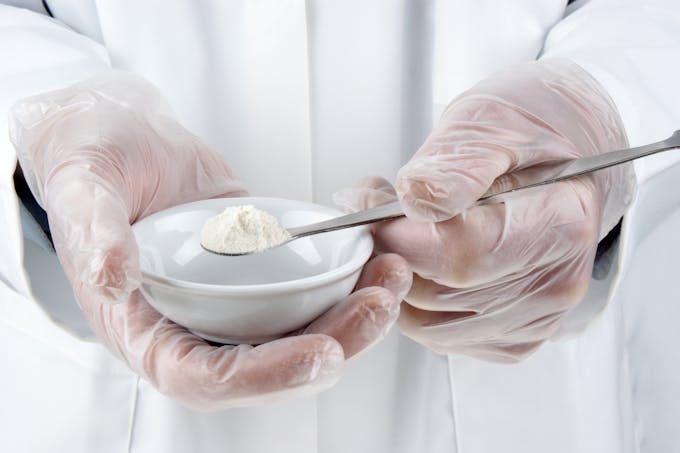Is Polydextrose Keto?
Keto is becoming increasingly popular, and it isn't surprising that the food industry pays attention. New keto-friendly foods and ingredients are pushed onto supermarket shelves weekly.
Synthetic food additives like polydextrose often are used to satisfy keto's high-fat, low-carb requirements. But do these products deliver on their "keto-friendly" claims?

What is polydextrose?
Polydextrose is a synthetic carbohydrate, not a natural ingredient. Food laboratories produce polydextrose by combining glucose, sorbitol, and citric acid from corn—a red flag when it comes to its use in keto-friendly products!
Your digestive system doesn’t digest polydextrose easily, making it a cheap, low-calorie bulking agent and multipurpose food ingredient for processed food products. It’s generally used to add texture, stabilize and maintain moisture, and replace sugar, fat, and starches. It also helps with melting and flavor release.
Here are some examples of processed foods that often contain polydextrose:
Frozen dairy desserts and ice cream
High-fiber dairy products
Infant formula
Soft candy
Sugar-reduced, sugar-free, and no-added sugar foods and beverages
Because of its chemical structure, your small intestines can’t digest polydextrose, making it similar to dietary fiber.
Fiber is excellent for your colon function and digestive health, right? Yes, but it is essential to remember that polydextrose is a synthetic fiber, not a natural fiber you get from your vegetables.
Consumers understand the health benefits of fiber now more than ever. Food manufacturers readily utilize this by adding polydextrose, making you believe your favorite snack is “high-fiber” and healthy.
In fact, the FDA permits listing polydextrose as fiber on food labels. Be aware of empty health claims and read ingredient lists to spot hidden food additives like polydextrose.

Why polydextrose isn’t safe on keto
You may have heard that polydextrose is a keto-friendly option because it has little to no impact on your blood sugar balance and insulin levels. But does this mean it's a safe and healthy ingredient for your keto diet? No, it doesn’t.
Polydextrose is a synthetic carbohydrate produced from genetically modified (GMO) corn, and researchers don't understand the long-term effects of GMO products on your health yet.
This recent study explains the impact of GMO foods on your gastrointestinal health, fertility, and liver health. Until you clearly understand how these foods affect physiologic functions, it's best to avoid polydextrose.
You also need to be aware of possible side effects. Polydextrose is an artificial food additive and can cause several digestive symptoms:
Abdominal cramping
9 “keto” food ingredients to avoid
To get the most out of your keto diet, be aware of common food ingredients which are not keto-friendly. Don't trust keto claims on food packages, and read those nutrition labels! Watch the above video to learn more about which ingredients to avoid.
Corn fiber
Corn fiber, or soluble corn fiber, is often used to replace sugar in processed foods. It’s generally produced using GMO corn and can cause several gastrointestinal symptoms. Gas, bloating, cramping, and diarrhea are corn fiber's most common side effects.
Maltodextrin
Maltodextrin is a highly processed carbohydrate. It tastes extremely sweet and ranks high on the glycemic index. Foods containing maltodextrin will spike your blood sugar and insulin levels more than sugar, pushing you quickly out of ketosis.
Dextrin
Dextrin is high in net carbs and isn't a keto-friendly option. One teaspoon of dextrin contains 3.6 grams of net carbs.
Dextrose
Dextrose is a synthetic sugar with a high glycemic index. Even small amounts of dextrose will raise your blood glucose level and kick you out of ketosis.
Dextrose is low in nutritional value, and you will find it frequently in packaged food products as a filler. Don't waste your daily net carbs on processed foods with little to no health benefits.
Polydextrose
This synthetic carbohydrate is generally produced from GMO corn and isn't a safe keto choice. You find it in various processed foods and beverages to replace fat and sugar. Read labels to identify which products contain polydextrose.
Maltitol
Maltitol, a sugar alcohol, has a glycemic index almost as high as pure sugar. It will throw your blood sugar and insulin out of balance, making maltitol unsuitable for keto.
Soy protein isolate
Most soy protein isolates are made from GMO soy products and are not a good choice for your Healthy Keto® diet. Soy isolates are not partially fermented like tofu or tempeh and can be hard on your liver and digestive system.
Splenda and other artificial sweeteners
Artificial sweeteners like Splenda (sucralose), aspartame, and saccharin are in most sugar-free food products and diet sodas. These sugar replacers may cause you to retain water (affecting body weight), increase your resistance to insulin, and alter your intestinal microflora.
Tapioca starch
Tapioca starch isn't a good option for keto. This food additive is high in net carbs and contains no fat or protein. Tapioca starch has almost no nutritional value, so it only increases your calorie intake. Even small amounts will kick you out of ketosis.

Key takeaways
Processed keto foods and snacks may be convenient but are all the ingredients safe and keto-friendly? Not always. For a full list of healthy keto-approved foods see our ketogenic diet food list.
Processed foods contain countless ingredients and hidden fillers. Don’t just trust that a product is keto. Read labels and understand which foods to avoid.
Follow Healthy Keto, a ketogenic diet combining high-fat, low-carb with organic, high-quality produce. Focusing on nutritious whole foods will reduce the number of food additives and artificial ingredients, letting you get the best out of your keto diet.
FAQ
1. What is polydextrose?
Polydextrose is a synthetic carbohydrate from corn that combines glucose, sorbitol, and citric acid. It’s often used as a starch, sugar, and fat replacement. Because of its chemical structure, it's similar to dietary fiber. Your body can't digest polydextrose, and most passes through your intestines.
2. Is polydextrose safe to eat?
Small amounts may be okay, but you should generally avoid polydextrose. Most corn used in polydextrose production is GMO. Until the long-term health consequences of GMO foods are clear, avoiding any ingredient made from GMO corn is best.
3. Is polydextrose keto-friendly?
No, polydextrose isn't keto friendly. It is a GMO ingredient and can cause gastrointestinal issues. Common side effects of polydextrose intake are bloating, gas and diarrhea.
4. Can I have polydextrose while fasting?
No, you can't have polydextrose while fasting. Polydextrose is a fiber and additive in processed food products that will break your fast.
5. Is polydextrose an artificial sweetener?
Polydextrose isn't an artificial sweetener. The flavor profile of polydextrose is somewhat tart, not sweet. It adds texture and bulk to foods rather than sweetness. Artificial sweeteners generally are high-intensity sweeteners like aspartame, sucralose, and saccharin.
6. Does polydextrose cause an insulin response?
Research indicates that polydextrose doesn't cause noticeable changes to your insulin levels. But do remember that lack of insulin response isn't the only factor that makes a food keto-friendly.
7. Is polydextrose inflammatory?
It's not yet fully understood if polydextrose causes inflammation. However, it generally is produced from GMO corn, and research has found links between GMO foods and inflammation in healthy subjects.
8. Does polydextrose raise blood sugar?
Polydextrose has a low glycemic index and doesn't significantly raise blood sugar. Its structure makes it hard for your body to digest and absorb polydextrose. The majority of it passes through your small intestine unchanged.
Because polydextrose remains largely undigested, it doesn't contribute much toward your daily energy intake, and you will find it added to many low-calorie foods.
9. What kind of sweetener is polydextrose?
Despite containing mainly glucose and sorbitol, polydextrose isn't a sweetener. Its chemical structure is more complex than sugar or dextrose and doesn't provide much sweetness when added to foods. You may find polydextrose in many low-calorie and low-sugar foods, but its function isn't to provide sweetness. It's mainly used to add fiber content and bulk to the product.
10. Is polydextrose a sugar alcohol?
No, it isn't. Polydextrose does contain small amounts of sorbitol, but it isn't a sugar alcohol.
11. Is polydextrose the same as sugar?
Both polydextrose and sugar contain glucose, but polydextrose isn't the same as sugar. It doesn't provide sweetness, isn't fully absorbed, and has little to no impact on your blood glucose levels. Sugar, on the other hand, is rapidly absorbed and has a high glycemic load.
12. Is polydextrose a dietary fiber?
Yes, polydextrose is a soluble fiber, an indigestible carbohydrate that feeds your gut bacteria. Dietary fibers increase elimination and are known to support healthy gut function. Despite health claims related to gut bacteria and digestion, there isn't any evidence that polydextrose, a synthetic fiber, has the same health benefits as the soluble fiber in whole foods and vegetables.
13. Is polydextrose good for constipation?
That depends. Polydextrose is an artificial soluble fiber that attracts water and forms a gel in the colon, which can help with regular bowel movements. However, polydextrose can cause diarrhea and other gastrointestinal symptoms if you are sensitive to synthetic carbohydrates.
14. Is polydextrose an inulin?
Polydextrose and inulin are similar but not identical. Inulin is a soluble fiber naturally occurring in plants like onions, artichokes, and chicory. Polydextrose is an artificial type of soluble fiber.
15. What is polydextrose found in?
Polydextrose was initially invented as a sugar replacement to lower the energy value of processed foods. It’s a bulking agent and increases the fiber content of frozen desserts, ice cream, high-fiber dairy products, infant formula, soft candy, and low-calorie foods.
16. Is polydextrose carcinogenic?
There’s no indication that polydextrose is carcinogenic. But it's commonly produced from GMO corn, and some studies found a potential link between some chemicals in GMO foods and cancer.
17. Is polydextrose natural?
No! Polydextrose doesn't exist in a natural form and is made up of little to no naturally-occurring components. It's synthetic and produced in laboratories.
18. Is polydextrose made from corn?
Yes. Polydextrose is made from corn. The glucose extracted from corn is chemically processed with sorbitol and citric acid to produce polydextrose.
19. What is the glycemic index of polydextrose?
The glycemic index of polydextrose is 7. This is relatively low compared to glucose which has a glycemic index of 100.
20. Is polydextrose the same as dextrose?
No, polydextrose and dextrose are different carbohydrates.
21. What is polydextrose used for?
Sugar-reduced, sugar-free, and no-added sugar foods are missing sugar or starch as a bulk ingredient. Polydextrose is cheap and remains largely undigested, making it an ideal bulking agent for processed food products.
22. Is polydextrose a carbohydrate?
Yes, polydextrose is a complex carbohydrate. It’s synthetically produced from corn and structurally similar to dietary fiber.
Up Next:
Previous blog
Reached Keto Goal and Now Need to Maintain WeightTags

Popular
08/31/2023
11.6K views
08/31/2023
14.6K views
08/31/2023
145.3K views
03/18/2024
11/21/2022




